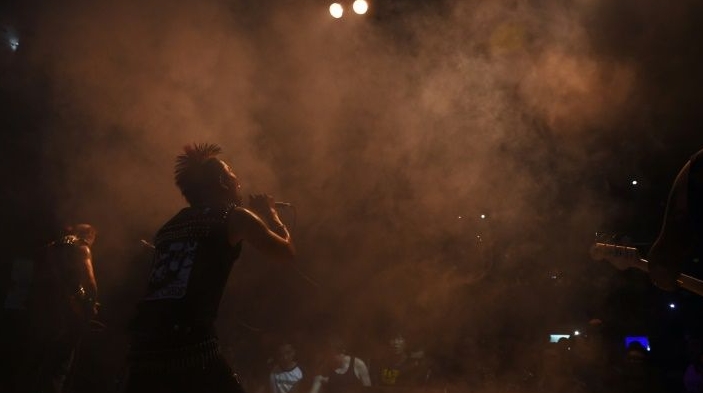By LAN Lianchao
WUHAN, China, June 2 (AFP) — Wuhan is arguably China's punk capital, its historically feisty reputation reflected in the writhing mosh pits and live venues of a vibrant music scene.
Or at least it was before coronavirus, which has tattooed a new outcast image on the city of 11 million and at the same time pulled the plug on the high-decibel subculture.
The city that gave the world COVID-19 remains fearful of new outbreaks, forbidding live shows, forcing performances online, and clouding the future.
"The eventual impact on us remains unknown," said Zhu Ning, founding member of a landmark Wuhan punk band and proprietor of indie live house VOX.
"The most important thing is to keep (the music scene) alive."
Wuhan's 11-week coronavirus lockdown was finally fully lifted in April as new infections abated, reawakening the city, but live shows remain banned.
"No performance means no customers and that means no revenue," Zhu, 48, told AFP inside his empty club, hours after police ordered him to call off an event.
Vox had planned to live-stream a show by Beijing-based rockers Queen Sea Big Shark.
"We were all ready and had to suddenly put a stop to it. What's wrong with the world?" Zhu sighed.
Located at China's centre, Wuhan is an ancient crossroads and site of a 1911 uprising that led to the collapse of thousands of years of imperial rule.
Home to several universities and their students, and the expat staff of multinational manufacturers, it is known for its openness to new ideas, while a massive industrial sector adds a blue-collar air.

'Not punk'
Its reputation for straight talk and quick tempers was captured on video when a top national official arrived in March to inspect epidemic-control efforts.
Communist authorities have endured unprecedented criticism after Wuhan officials initially suppressed news of the outbreak and fumbled the initial response, and the official was jeered by locals sequestered in their apartment blocks.
Zhu is the former drummer for pioneering Wuhan punk band SMZB, which emerged in the late 1990s with several other local groups, earning Wuhan a reputation as one of China's punk crucibles, along with Beijing.
SMZB's frontman, Wuhan-born guitarist Wu Wei, is recognised as the godfather of Chinese punk, penning provocative lyrics that sometimes criticise authorities. He also founded Wuhan Prison, another punk landmark, a decade ago.
"This is a place where many people gather together and pass on their energy," said Ingmar Liu, 21-year-old vocalist for a local band and a Wuhan Prison employee.
But Liu, with green hair and a series of surreal arm tattoos, said the club has struggled to pay its rent without customers.
A mid-May attempt to reopen was quickly aborted by police due to COVID-19 transmission fears.
"The epidemic has impacted the entire bar and concert industry, not just us," she said.
It has also scattered musicians for local bands, including foreigners, said members of reggae/ska band Sky King Jack.
Unable to perform, they gather in private for loose rehearsals, waiting to take the stage again.
"The band can't make money and now we play music just for fun," bassist Liu Jia said after assembling for practice at a rented cottage.
It remains to be seen whether Wuhan's famed frankness will be reflected in future songs referencing the pandemic.
"I was very angry with the government's handling of the coronavirus at first, but now I have digested it," said Ingmar Liu.
"Anger alone is not punk."
ADVERTISEMENT
ADVERTISEMENT


































